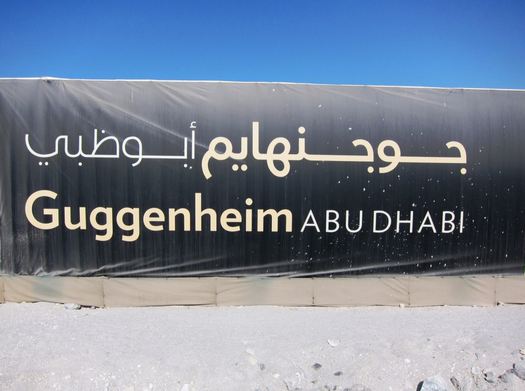
Construction site for Guggenheim Abu Dhabi, planned to open in 2017. Courtesy Human Rights Watch.
A spectacle unfolded at the Guggenheim this weekend. GULF labor activists (a coalition including Occupy Museums) dropped banners and sprinkled leaflets down the sides of the museum’s rotunda. Their goal for the evening was fairly straightforward: to bring attention to the Guggenheim’s labor practices in Abu Dhabi, where the kafala system remains widespread. (Kafala tethers a migrant contract worker to one employer and workers are often denied basic human rights.) GULF’s protest continued this week with a more subdued event outside of NYU, another institution undergoing scrutiny for its labor practices in Abu Dhabi.
But the gathering wasn’t too small. “I can’t hear you, there’s a protest,” spurted one phone-wielding student.
She stood across the street from GULF and NYU Slam activists who’d gathered along Washington Park’s southern edge. Their glove-covered hands held poster boards marked with slogans like “We demand workers rights” “Independent Monitor” and “Students & Workers Unite.”
This was at about 7:00 PM, right after a public talk by Nick McGeehan (Human Rights Watch) and NYU Professor Andrew Ross on the topic of migrant workers in Abu Dhabi. I caught the tail end of their conversation, but the gist is this: Labor conditions in Abu Dhabi have been improving, but it’s hard to gauge because there’s no real independent monitors.
For example, Mott MacDonald, the contractor hired by NYU to examine kafala working conditions, is not truly independent; McGeehan mentioned they’re also “in charge of the electricity and responsible for [maintaining ] the sewage and gas” on Abu Dhabi.
Unlike NYU, the Guggenheim does not have a full-fledged campus yet; theirs is scheduled for completion in 2017. But herein lies an opportunity: There’s still time for the institution to set best practices that NYU failed to meet. These “brand names,” McGeehan mentioned, should be used “as leverage to break the kafala system.”
Instead, we get used to hearing the western “not my problem” response. Yesterday architect Zaha Hadid, whose FIFA World Cup stadium is currently under construction in Qatar, was asked about the country’s reported human rights abuses. These include the deaths of over 800 migrant workers. One sentence from the lengthier reply sums up her sentiment: “It’s not my duty as an architect to look at it.”


Comments on this entry are closed.